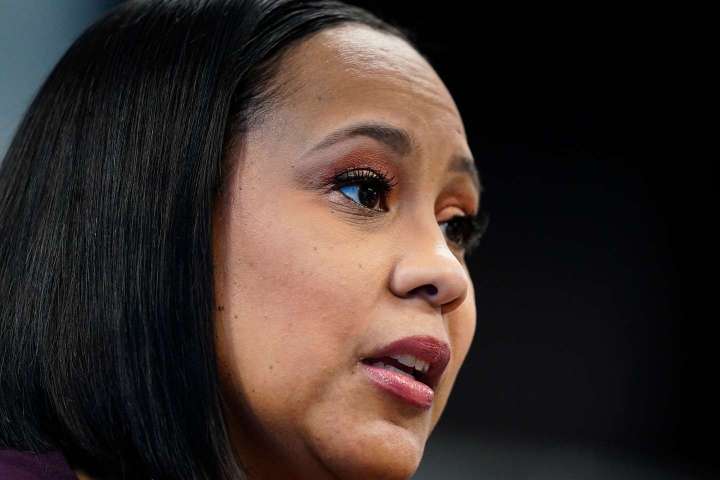It’s become conventional wisdom that if former president Donald Trump faces criminal charges in the coming months, it’s more likely to come from Georgia or New York than the Justice Department. Probes in those states have progressed significantly, without some of the thorny issues that come with potential charges being brought by a federal government run by the man who defeated Trump — and who could face him again in 2024.
‘Optics are horrific’: Political pitfalls of Trump probes by Democrats

But those other potential prosecutions also have their thorns — as the prosecutors involved have unnecessarily reinforced.
An Atlanta judge on Monday barred Fulton County District Attorney Fani Willis (D) from investigating one of Georgia’s “fake electors” for Trump, state Sen. Burt Jones (R), citing a June fundraiser that Willis hosted for Jones’s Democratic opponent in the lieutenant governor’s race.
Willis’s probe last week named the fake electors as “targets” of the investigation into Trump’s efforts to overturn the election in Georgia. This was a significant move, given theories about the criminal liability those fake electors could face for declaring themselves valid electors in states Trump didn’t win. Judge Robert McBurney rejected efforts by 11 other fake electors to disqualify Willis from their portions of the investigation.
McBurney didn’t hold back in rebuking Willis for the fundraiser.
“This scenario creates a plain — and actual and untenable — conflict,” McBurney wrote. “Any decision the District Attorney makes about Senator Jones in connection with the grand jury investigation is necessarily infected by it.”
While the decision came as something of a surprise, McBurney was arguably even blunter last week.
“It’s a ‘What are you thinking?’ moment,” he said of the fundraiser. “The optics are horrific.”
But it’s not the first time one of the prosecutors leading these other probes has run into criticism for political activity with regard to a subject of their investigations. New York Attorney General Letitia James (D) campaigned in 2018 by playing up her intent to scrutinize Trump, whose business is based in her state. After the New York Times’s massive investigation into Trump’s tax dodges was published in October of that year, she concluded in a statement: “Donald Trump’s days of defrauding Americans are coming to an end.”
On election night, after she was declared the winner, she immediately turned to that issue.
“And as the next attorney general of his home state, I will be shining a bright light into every dark corner of his real estate dealings, and every dealing, demanding truthfulness at every turn,” she said.
As the New York Times noted weeks later, this raised concerns among even some Trump critics that James could open herself up to charges of running a politicized investigation — and that it could even hurt the case if it ever came before a judge. Daniel Goldman, a lawyer who worked on Trump’s first impeachment, told the Times that James’s comments “give the appearance of an individualized political vendetta.”
When James announced last year that she was cooperating with Manhattan District Attorney Cyrus R. Vance Jr.’s criminal probe into Trump, it was viewed as a significant ramping up of the scrutiny. But a former prosecutor in the Manhattan District Attorney’s Office suggested to me that the cooperation could cut both ways.
“There’s one other consideration: Letitia James has undermined her own credibility in this investigation because she campaigned on the promise that she would pursue the Trump family,” said Rebecca Roiphe, who now teaches at New York Law School. “These campaign statements were wildly inappropriate and cast a cloud over her investigation.”
A federal judge in May rejected a Trump lawsuit against James seeking to halt her civil investigation because of alleged political targeting. The judge said Trump didn’t prove that James acted in bad faith, as required, but indicated that her statements could suggest animus. “The fact that Defendant’s public statements reflect personal and/or political animus toward Plaintiffs is not, in and of itself, sufficient,” U.S. District Judge Brenda Sannes wrote.
That both prosecutors leading the charge in investigating Trump would sound and appear like Democrats isn’t totally surprising: They are Democrats. The United States has the worldwide distinction of making these offices elected positions in the vast majority of cases. The benefit is that they are more directly accountable to the people they’re charged with protecting; the drawback is that prosecutions could appear politicized — particularly when these same people take part in political campaigns that might touch on the people they investigate.
And perhaps nobody in modern political history has gotten more traction in claiming political targeting than Trump, who has rallied his base behind the idea that any number of investigations of him were “witch hunts” run by people who sought to take him down at any cost. When it wasn’t Democrats, it was the supposed “deep state.”
Willis’s conduct, notably, dealt not with a conflict involving Trump himself but rather one Trump-supporting target of her investigation. And Trump’s first big attempt to use this argument against James didn’t pan out — somewhat predictably, given the standard required for the long-shot lawsuit he filed.
But that doesn’t mean that the argument is over with, legally speaking, or that it might not matter politically, which is where all of this might ultimately be decided.
As McBurney put it Monday, while discussing Willis’s conduct: “An investigation of this significance, garnering the public attention it necessarily does and touching so many political nerves in our society, cannot be burdened by legitimate doubts about the District Attorney’s motives,” he wrote. “The District Attorney does not have to be apolitical, but her investigations do.”






